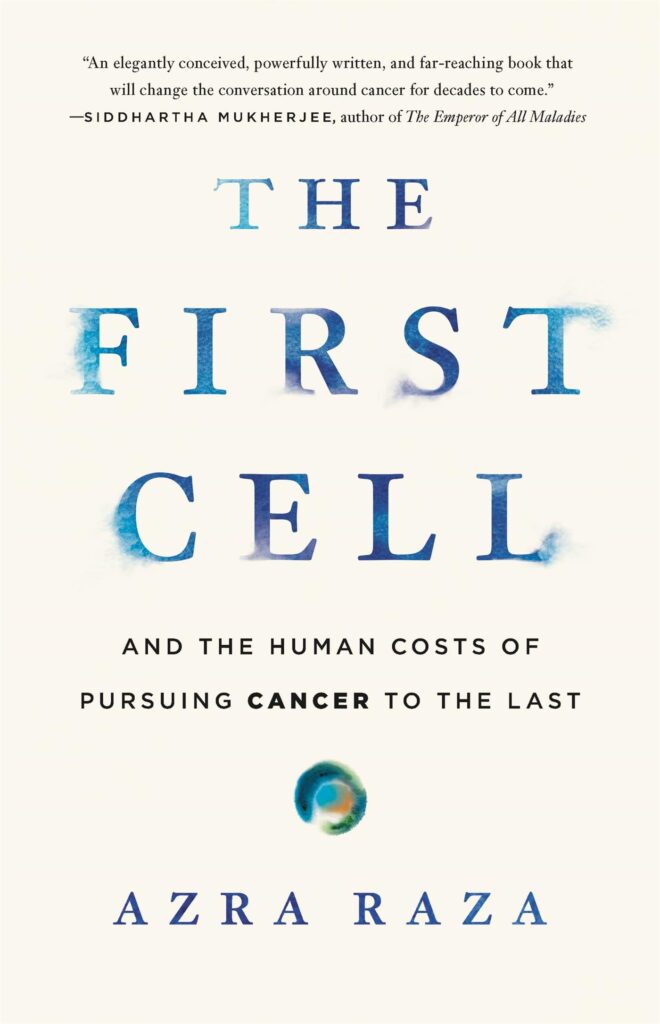Reviewed by Dr. Debleena Bhattachaarya

The First Cell by Azra Raza is a deeply personal, provocative, and critical examination of the way we approach cancer research, treatment, and care. Raza, an oncologist with decades of experience treating cancer patients, offers an insightful, yet often unsettling perspective on the realities of cancer treatment, the limits of current medical technology, and the human costs of the disease. The book challenges the prevailing narrative of cancer as a “battle” to be won and calls for a fundamental rethinking of how we fight this global health crisis.
In The First Cell, Raza pulls back the curtain on the complexities of cancer from the vantage point of both a practicing oncologist and a researcher. The central thesis of the book is that modern oncology, despite many advances in treatment and understanding, is still largely inadequate in curing cancer, particularly in its metastatic stages. She argues that the focus of cancer research has been overly concentrated on developing drugs to treat later-stage cancer, rather than seeking ways to prevent or intercept cancer in its earliest phases—the “first cell”—when it is most vulnerable and potentially curable.
Raza’s perspective is informed by the personal tragedy of losing her own husband, the renowned oncologist Dr. Irfan Raza, to leukemia. She vividly describes the emotional and psychological toll that his illness and death took on her, as well as the broader human cost of cancer in her practice. Her experience highlights a critical frustration: that despite immense financial investment and significant medical advances, cancer remains an elusive, often fatal disease. Through her own grief, Raza poignantly argues that the medical establishment has failed to deliver on the promises of revolutionary cancer cures.
The personal is intertwined with the scientific in The First Cell. Raza speaks directly to the emotional weight of cancer, not only for patients but also for families and healthcare professionals who bear witness to the suffering and often futile fight against the disease. She calls for an end to the rhetoric of “fighting” and “winning” against cancer, framing it instead as a disease that requires a more nuanced, humane, and scientific approach to understanding its origins, behavior, and treatment.
A major theme in The First Cell is Raza’s critique of how cancer research is conducted and the direction it has taken in the last few decades. She argues that much of the focus has been on finding therapies for late-stage cancer rather than addressing the disease’s origins at the molecular and cellular levels. While advancements in targeted therapies, immunotherapy, and precision medicine have been made, these treatments are often only effective in a small subset of patients, and they do not represent a cure for most types of cancer.
Raza points to the “war on cancer” mentality, popularized in the 1970s, as a key driver of this misguided focus. This metaphor of cancer as an enemy to be defeated with ever more sophisticated weapons has, according to Raza, not only led to a misallocation of resources but also created unrealistic expectations. The promise of a cure for cancer has proven elusive, and yet the funding continues to flow into treatments that offer incremental rather than transformative benefits. She is particularly critical of the fact that billions of dollars are spent on therapies that prolong life by only a few months, while relatively little attention is paid to prevention and early detection.
One of the central calls of The First Cell is for a paradigm shift in cancer research, one that moves away from the focus on late-stage treatments and toward prevention, early detection, and the search for therapies that can target cancer at the very moment of its origin—the first cell. Raza advocates for a move toward a more holistic approach to cancer, one that considers the social, environmental, and genetic factors that contribute to the disease’s development.
She also pushes for a deeper understanding of the biology of cancer cells, particularly their ability to evolve and outsmart treatments over time. This adaptability, she argues, is a major reason why many cancer therapies fail. By focusing on the earliest stages of cancer, scientists may be able to develop more effective, less toxic treatments that halt the disease before it ever becomes a life-threatening problem.
At its core, The First Cell is not just a critique of cancer treatment but also a meditation on the human cost of medical progress—or the lack thereof. Raza highlights the suffering of patients who undergo aggressive treatments that are ultimately futile. She underscores the ethical questions surrounding cancer care, particularly in the context of the financial and emotional burdens placed on patients, families, and the healthcare system.
Raza’s reflections are sobering but necessary. She raises tough questions about the commercialization of cancer research, the rising costs of treatment, and the often misguided priorities of pharmaceutical companies, which are more interested in developing expensive new treatments for late-stage cancers than in finding ways to prevent cancer or cure it in its earliest stages.
Raza’s writing is clear, engaging, and passionate. She blends personal anecdotes with scientific insights, making complex medical concepts accessible to a general audience. While the book is grounded in scientific research, it never becomes too technical or inaccessible. Raza’s ability to humanize the experience of cancer—both from the perspective of patients and medical professionals—gives the book an emotional depth that is rare in books about medical science.
Her narrative is deeply reflective, with an undertone of urgency as she calls for change. She doesn’t shy away from the tough realities of cancer care, but she also brings hope, suggesting that a new, more humane, and effective approach to cancer treatment is possible.
The First Cell is a powerful, compelling book that challenges the status quo of cancer treatment and research. Azra Raza’s unique perspective—shaped by her personal loss and professional experience—offers readers an eye-opening look at the current state of cancer care and the need for a paradigm shift in how we think about and approach the disease. It is a book that not only critiques the failures of the system but also proposes a hopeful, albeit difficult, path forward.
For anyone interested in cancer research, healthcare ethics, or the personal dimensions of illness, The First Cell is a must-read. It is both a sobering reminder of how far we have to go in the fight against cancer and a call to action to rethink how we approach one of humanity’s most persistent and devastating diseases.

